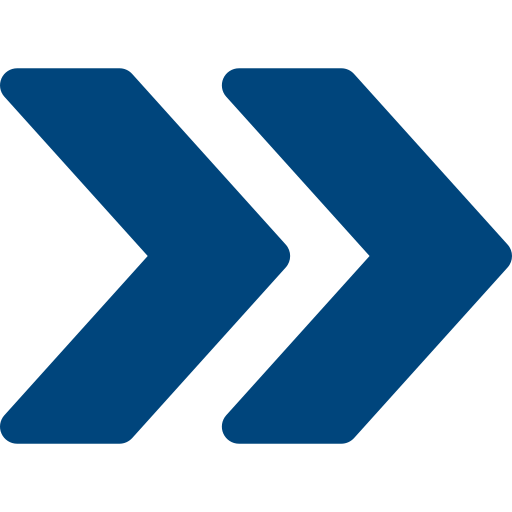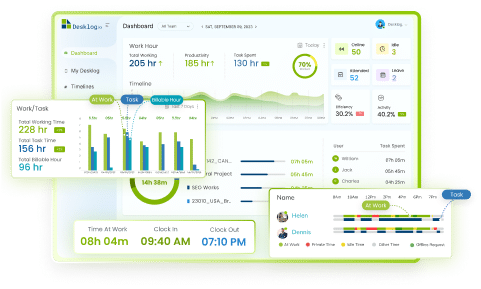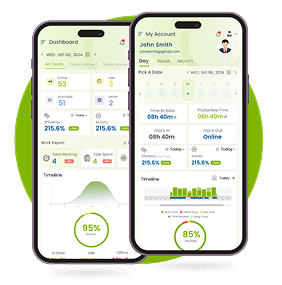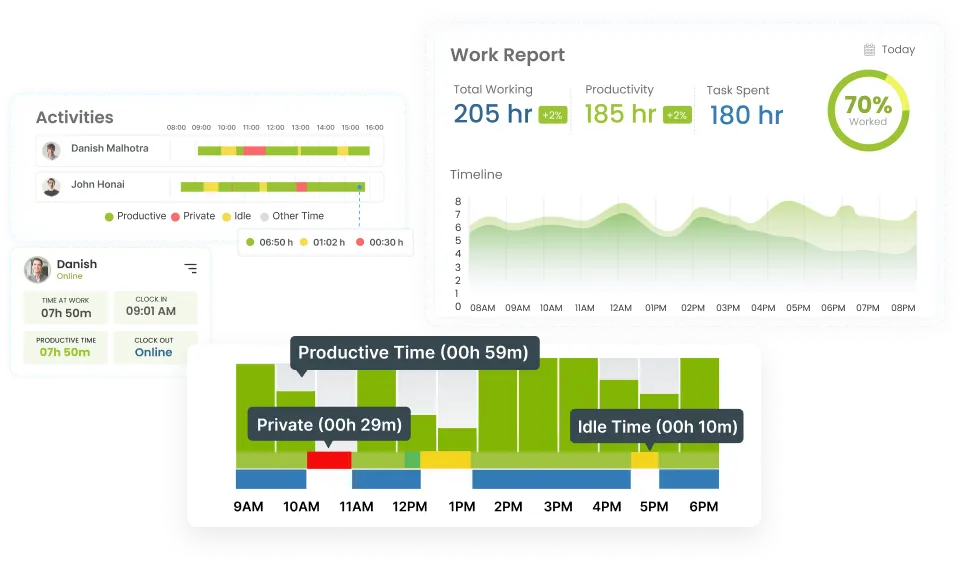Time efficiency today is like trying to catch a bus that’s already speeding down the street – if you don’t act fast, you’ll miss it, and then you’re left scrambling to figure out when the next one comes. With increasing demands across work, personal life, and digital connectivity, the ability to manage time efficiently is no longer just a skill—it’s a necessity.
People spend an average of 3.6 hours a day on their smartphones, yet over 70% of them feel they don’t have enough time to accomplish their daily goals. This statistic highlights a disconnect between the time available and the time used productively—underscoring the importance of refining time management practices to achieve more in less time.
So what is time efficiency? What are its benefits and what are some of the proven strategies to make your time management better? How can productivity tools like time tracking softwares improve this experience? In this blog, we will look at each of these in detail, so read on and find all the answers you’re looking for!
What is Time Efficiency?
Time efficiency is the skill of completing tasks or reaching goals in the least amount of time possible, all while ensuring a satisfactory level of quality is maintained.
Time efficiency is essential for both personal and professional success as it enables individuals to boost productivity, minimize stress and make the best use of available resources. With effective time management, one can prioritize important tasks, meet deadlines, and accomplish goals more efficiently.
In a professional setting, time-efficient individuals are often viewed as dependable and skilled, which can open doors to greater career opportunities and growth. Personally, it fosters a healthier work-life balance, allowing more time for self-improvement.
Key Benefits of Time Efficiency

Increased Productivity
Efficiently managing time allows individuals to accomplish more tasks in less time, leading to a significant boost in overall productivity. By focusing on high-priority tasks and avoiding distractions, people can avoid time costs and complete work faster.

Case Study |
|
|---|---|
|
A study by the American Psychological Association found that workers who used time management strategies were 25% more productive compared to those who didn’t. |
|

Reduced Stress
When time is managed effectively, individuals experience less pressure and stress. Knowing what needs to be done and having a clear plan helps prevent project backlogs and the anxiety that arises from looming deadlines or unfinished tasks.

Case Study |
|
|---|---|
|
In a Harvard Business Review article, it was noted that employees who adopted time management techniques like the Pomodoro technique (focused work intervals with breaks) reported a 30% reduction in work-related stress. |
|

Improved Decision-Making
Effective time management gives individuals the space to evaluate situations carefully and make informed decisions rather than rushing through them due to time constraints.

Case Study |
|
|---|---|
|
CEOs and high-level managers often delegate tasks strategically, allowing them to focus on decision-making. Elon Musk, for instance, is known for his strict time-boxing methods to ensure he allocates time for innovation and critical decisions in his ventures like Tesla and SpaceX. |
|

Better Work-Life Balance
Time efficiency helps to create a more balanced lifestyle by allowing individuals to allocate time for both professional and personal commitments. By completing work efficiently, more time is freed up for family, hobbies, and relaxation, leading to a fulfilled life.

Case Study |
|
|---|---|
|
Tim Ferriss, author of The 4-Hour Workweek, advocates for time management techniques, specifically Pareto Principle, as a way to reduce work hours and increase personal time. Many readers who applied his strategies reported feeling less overwhelmed and having more time for travel, fitness, and leisure activities. |
|

Faster Career Growth
An increased employee efficiency rates makes individuals more reliable and consistent, leading to recognition and potential promotions in the workplace. When you consistently meet deadlines and produce high-quality work in less time, it reflects well on your professional reputation.

Case Study |
|
|---|---|
|
Sheryl Sandberg, COO of Facebook, has often discussed how effective time management was key to balancing her career and family life. Her ability to focus on high-impact tasks rather than getting bogged down in trivial details helped her climb to a leadership position in one of the world’s most influential tech companies. |
|

Better Focus and Concentration
Managing time effectively reduces distractions and helps individuals maintain better focus on tasks at hand. By eliminating multitasking and focusing on one task at a time, people achieve higher quality results in less time.

Case Study |
|
|---|---|
|
A study from Stanford University revealed that multitasking reduces productivity by 40%, while individuals who practiced single-tasking and time management were able to complete tasks with greater efficiency and accuracy. |
|
Step-by-Step Guide to Enhancing Time Efficiency
1. Evaluate Your Current Habits
To improve your efficiency, it’s essential to first understand how you’re currently spending your time. Without a clear picture of your habits, it’s difficult to know where improvements can be made.
Actionable Steps
- Track Your Time: Use time tracking tools to log your daily activities. Record how much time you spend on work tasks, meetings, social media, breaks and even downtime. This will help you identify patterns and areas where time is being wasted.
- Analyze Your Findings: After tracking for a week or two, look for tasks or habits that consume more time than necessary. Identifying these time drains is the first step in improving time management.
2. Set Clear, Achievable Goals
Setting clear and achievable goals provides you with direction, focus, and a sense of accomplishment. It’s crucial to set goals that are both motivating and realistic.
Actionable Steps:
-
Use SMART Criteria: Ensure your goals are:
- Specific: Clearly define what you want to achieve.
- Measurable: Quantify how you’ll measure progress or success.
- Achievable: Ensure the goal is realistic given your current resources and time constraints.
- Relevant: Make sure the goal aligns with your broader objectives.
- Time-bound: Set a deadline to accomplish the goal.
- Break Down Large Goals: Break larger goals into smaller, manageable tasks. This helps prevent feeling overwhelmed and allows for easier tracking of progress.
3. Prioritize Tasks Effectively
Not all tasks are created equal. To maximize efficiency, it’s essential to prioritize tasks that are both urgent and important, while minimizing time spent on less impactful activities.
Actionable Steps:
- Use the Time Management Matrix: This is a simple decision-making tool that divides
tasks into four
categories:
- Urgent and Important (Do Now): Tasks that require immediate attention
- Important, Not Urgent (Schedule): Tasks that are important but can be planned for later
- Urgent, Not Important (Delegate): Tasks that are urgent but don’t contribute to long-term goals
- Not Urgent, Not Important (Eliminate): Tasks that are neither urgent nor important
- Daily Task List: Every morning, create a to-do list that categorizes tasks using the Time Management Matrix. Start with the “Do Now” tasks to ensure you’re addressing your most critical responsibilities first.
4. Reduce Distractions
Distractions are a major time thief. Reducing interruptions and eliminating unnecessary distractions can significantly improve efficiency and focus.
Actionable Steps:
- Create a Dedicated Workspace: If possible, set up a specific area for work where distractions are minimized. This can include turning off notifications on your phone, using noise-canceling headphones, or establishing a quiet room.
- Time Blocking: Schedule focused work blocks where you commit to working on a specific task without checking email or social media.
Improve your Time Efficiency with Desklog Time Tracking Software
Did you know that businesses that encourage employees to track their time more effectively can see revenue increases of up to 61%? Having a reliable system to help you stay focused at work without distractions is a lifesaver, and this is where productivity tools like Desklog come in.
Desklog is a complete productivity software that offers accurate insights into the time we spend at work. It provides an advanced, free time tracking solution designed to boost productivity and simplify workflows.
Desklog’s advanced automation capabilities track time spent on tasks and projects flawlessly, even when users are offline. By removing the need for manual time entries, it guarantees precise and dependable data, enabling better decision-making. Let’s learn the main features of Desklog in detail:
Automated Time Tracking
Desklog’s automated time tracking feature offers tracking of time automatically, ensuring that every moment you spend at work is accounted for. By offering clear insights into time distribution and upcoming deadlines, Desklog helps uncover productivity trends, optimize resource allocation and improve overall efficiency.
Idle Time Tracking
Desklog’s idle time tracking feature tracks periods when employees are not actively engaged at work. This data is crucial for understanding time management and addressing inefficiencies to pinpoint areas for improvement, enabling better resource allocation and time optimization.
Offline Time Tracking
Desklog’s offline time tracking feature tracks time even when there’s no network connection, useful especially for remote employee management. This feature enhances overall efficiency by preventing data loss and supporting continuous productivity.
Automated Timesheet
Desklog’s automated timesheet software simplifies tracking work hours by automatically recording daily, weekly, and monthly data accurately. With easy access to hours worked and downloadable timesheets, this feature improves efficiency by minimizing administrative tasks, allowing more focus on your core responsibilities.
Project Time Tracking
Desklog’s Project time tracking feature offers automated tracking of the time spent on tasks and projects, helping users achieve their goals with precision. By offering subtask management, this feature improves efficiency by breaking down large tasks into smaller, more manageable components, enabling employees to focus on specific actions and track progress more effectively.
Kanban View
Kanban View lets you visualise tasks across different stages to effectively track project progress. With the drag-and-drop functionality, you can track project milestones and ensure smooth transitions between phases. This feature improves efficiency by providing a clear overview of task status, helping teams prioritize and address bottlenecks quickly.
Advanced User & Task Timeline
Desklog uses advanced user and task timelines to accurately track working hours. The timeline starts automatically when a task begins and stops when paused, ensuring precise tracking and visualization of total working and task times. This feature improves efficiency by clearly visualizing task durations, helping users identify time gaps.
Activity Tracking
Desklog’s activity tracking feature tracks and records actions like keyboard strokes, mouse movements, application and website visits with optional screenshots. This feature improves efficiency by capturing real-time data on work habits, allowing you to pinpoint inefficiencies, optimize workflows and make adjustments to maximize time utilization.
Common Pitfalls in Time Efficiency and How to Avoid Them
Procrastination
One of the most common obstacles to efficiency is procrastination. Putting off tasks until the last minute creates unnecessary stress and can lead to rushed work that doesn’t meet quality standards.
How to Avoid Procrastination:
-
Break Tasks Into Smaller Steps: Large tasks can feel overwhelming, which leads to procrastination. Break them into smaller, manageable parts and tackle them one by one. This makes the task feel less daunting and easier to start.
-
Use the 2-Minute Rule: If a task will take less than 2 minutes to complete, do it immediately. This helps prevent small tasks from piling up and creating unnecessary pressure later on.
-
Set Clear Deadlines: Even for non-urgent tasks, setting artificial deadlines helps maintain a sense of urgency. Commit to completing tasks within a specific time frame, and treat it like a real deadline.
Overcommitting to Tasks
Taking on too many tasks can overwhelm you and reduce your ability to focus on what’s important. Saying yes to every opportunity or request can stretch you thin and lower productivity.
How to Avoid Overcommitting:

Learn to Say No
It’s essential to recognize your limits and decline tasks or projects that aren’t aligned with your priorities or that would overwhelm your schedule. Be polite but firm when you can’t take something on.

Prioritize
Regularly review your commitments to determine if something is truly urgent and important. This helps you focus on the most critical tasks and eliminate unnecessary ones.

Delegate
If possible, delegate tasks that others can do just as well or better. This frees up your time for more significant responsibilities.
Multitasking
While it may feel productive, multitasking often results in lower quality work, increased errors and longer completion times. Your brain is simply not built to handle multiple complex tasks at once efficiently.
How to Avoid Multitasking
-
Single-Tasking: Focus on one task at a time to maintain a higher level of concentration and accuracy. Techniques like the Pomodoro method or time-blocking can help you focus on single tasks for a set period.
-
Prioritize Tasks: Use the Eisenhower Box or a to-do list to focus on what’s most important, rather than bouncing between tasks that don’t align with your primary objectives.
-
Take Breaks: Give yourself short breaks between tasks to recharge. This helps prevent mental fatigue, allowing you to perform better on the next task.
Failure to Reflect and Adjust
Without regularly assessing your time management using time management apps, you may fall into old, unproductive habits. If you don’t stop to reflect on what’s working and what’s not, you’ll miss opportunities to improve.
How to Avoid It:
-
Conduct Weekly Reviews: Take time at the end of each week to reflect on what went well and what could be improved. Identify time-wasting activities and think about how to eliminate or minimize them.
-
Adjust Your Methods: If you notice that certain strategies or tools aren’t working, be flexible and make adjustments. Efficiency is a skill that evolves as your work and life circumstances change.
-
Seek Feedback: Ask colleagues, mentors, or friends for feedback on how you’re managing your time. External perspectives can provide insights you may have missed.
Conclusion
In conclusion, time efficiency is essential for both personal and professional success. Improving it requires ongoing effort, including evaluating current habits, setting clear goals, prioritizing tasks, and minimizing distractions.
Avoiding common pitfalls like procrastination, overcommitting, multitasking, and perfectionism is crucial for enhancing efficiency. By using time management techniques and productivity tools, setting boundaries, planning strategically, and regularly reviewing progress, we can stay focused on what truly matters and optimize our time for success.
Ready to take control of your business’s time management?
FAQ
1 What is time efficiency?
Time efficiency is the ability to complete tasks or reach goals in the least amount of time, while still maintaining a satisfactory level of quality. It can be viewed as a measure of how effectively you use the time and resources available to accomplish a specific objective.
2Why is time efficiency important?
Effective time management boosts productivity and efficiency. By prioritizing tasks and setting achievable deadlines, you can direct your energy toward the most urgent tasks and complete them on time. As a result, this will improve your overall job satisfaction.
3How do you calculate efficiency?
To calculate efficiency over time, divide the number of standard labor hours by the time a task consumed and multiply by 100. For example, if a project had 100 allotted labor hours but took 120 to complete, the project would have an efficiency rating of 83%.
4How can I improve my efficiency?
Improving efficiency involves prioritizing tasks, eliminating distractions, setting clear and achievable goals, using time management techniques, and utilizing productivity tools. Focusing on single-tasking rather than multitasking also enhances efficiency.
5What are some common time-wasting habits?
Common time-wasting habits include procrastination, multitasking, overcommitting to tasks and allowing distractions such as social media or unnecessary interruptions to derail your focus.
6What is the difference between time management and time efficiency?
Time management is about organizing and planning how to divide your time between various tasks, while time efficiency focuses on doing those tasks in the shortest time possible without sacrificing quality. Time efficiency is a component of effective time management.
7Can time efficiency help in personal life?
Yes, efficiency can significantly improve personal life by helping individuals manage their household responsibilities, hobbies, family time, and personal goals. By organizing and prioritizing tasks, you can enjoy a more balanced and fulfilling life outside of work.

















